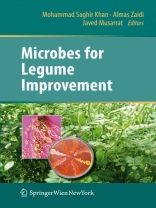Microbes for Legume Improvement comprises 21 chapters and provides comprehensive information on concepts of microbial technology for the improvement of legumes grown in different agro-ecosystems. The role of microbes including symbiotic nitrogen fixers, asymbiotic nitrogen fixing bacteria (like Azospirillum), plant growth promoting rhizobacteria (PGPR), phosphate-solubilizing microbes, arbuscular mycorrhizal fungi and biocontrol agents in the improvement of both conventional and forage legumes growth is discussed. The role of bacterial biofilms in legume-Rhizobium interactions and metal tolerant microbes in the improvement of legumes is dealt separately. Furthermore, recent findings on the taxonomic status of rhizobia, various signal molecules affecting symbiosis, legume-pathogen and legume-rhizobial interactions and proteomic analysis of legume–microbe interactions are addressed.
This volume gives a broad view of legume disease management using microbes and presents strategies for the management of cultivated legumes. It is therefore of special interest to both academics and professionals working in the field of microbiology, soil microbiology, environment microbiology, biotechnology and agronomy as well as plant protection sciences.
Tabella dei contenuti
Bacteria Involved in Nitrogen-Fixing Legume Symbiosis: Current Taxonomic Perspective.- Enhancing Rhizobium–Legume Symbiosis Using Signaling Factors.- Key Molecules Involved in Beneficial Infection Process in Rhizobia–Legume Symbiosis.- Recent Advances in Rhizobium–Legume Interactions: A Proteomic Approach.- Role of Ethylene and Bacterial ACC Deaminase in Nodulation of Legumes.- Microbial Biofilms: How Effective in Rhizobium–Legume Symbiosis?.- Potential of Rhizobia as Plant Growth-Promoting Rhizobacteria.- Engineering Nodulation Competitiveness of Rhizobial Bioinoculants in Soils.- Growth Promotion of Legumes by Inoculation of Rhizosphere Bacteria.- Mycorrhizosphere Interactions for Legume Improvement.- Role of Phosphate-Solubilizing Bacteria in Legume Improvement.- Legume Responses to Arbuscular Mycorrhizal Fungi Inoculation in Sustainable Agriculture.- Bacterial Biofilms: Role in Rhizobium–Legume Symbiosis.- Role of Metal Tolerant Microbes in Legume Improvement.- Legumes–Microbes Interactions Under Stressed Environments.- Role of Azospirillum in the Improvement of Legumes.- Role of Arbuscular Mycorrhizal Fungi in Nitrogen Fixation in Legumes.- Symbiotic Nitrogen Fixation in Tropical Food Grain Legumes: Current Status.- Plant Growth Promoting Rhizobacteria Improving the Legume–Rhizobia Symbiosis.- The Potential Use of Rhizobium–Legume Symbiosis for Enhancing Plant Growth and Management of Plant Diseases.- Microbial Inoculants for Sustainable Legume Production.
Circa l’autore
Mohammad Saghir Khan, Ph.D., is an Associate Professor at the Department of Agricultural Microbiology, Aligarh Muslim University, Aligarh, India. Dr. Khan received his M.Sc. from Aligarh Muslim University, Aligarh, India, and his Ph.D. (Microbiology) from Govind Ballabh Pant University of Agriculture and Technology, Pantnagar, India. He has been teaching Microbiology to post-graduate students for the last 13 years and has research experience of 17 years. In addition to his teaching, Dr. Khan is engaged in guiding students for their doctoral degree in Microbiology. He has published over 50 scientific papers including original research articles, review articles and book chapters in various national and international publication media. Dr. Khan has also edited three books published by the leading publishers. His interest in the various aspects and applications of Microbiology coupled with his classroom and laboratory experience makes him uniquely qualified to author this book. He is deeply involved in research activities focusing mainly on rhizobiology, microbiology, environmental microbiology, especially heavy metals-microbes-legume interaction, bioremediation, pesticide-PGPR-plant interaction, biofertilizers and rhizo-immunology.
Almas Zaidi, received her M.Sc. and Ph.D. (Agricultural Microbiology) from Aligarh Muslim University, Aligarh, India and is currently serving as Guest faculty/Assistant Professor at the Department of Agricultural Microbiology, Aligarh Muslim University, Aligarh, India. She has been teaching Microbiology at post graduate level for the last five years and has research experience of 13 years. She has published about 40 research papers and review articles in journals of national and international repute. She has also contributed chapters to different books. Dr. Zaidi has edited three books published by the leading publishers. Her main focus of research is to address problems related with rhizo-microbiology, microbiology, environmentalmicrobiology, and biofertilizer technology.
Javed Musarrat, M.Sc., Ph.D. (Biochemistry), former Chairman of the Department of Agricultural Microbiology and Ex-Dean, Faculty of Agricultural Sciences, Aligarh Muslim University, Aligarh, India, is presently working as a Professor, DNA Research Chair at the King Saud University, Riyadh, Saudi Arabia. He has been teaching Biochemistry, Microbiology and Molecular Biology to post-graduate students for the last 23 years and has research experience of about 25 years. He has contributed more than 50 national and international scientific publications. Dr. Musarrat has edited two books published by the leading publishers. He is associated with several scientific bodies such as Department of Biotechnology, Council of Scientific and Industrial Research, University Grants Commission, Indian Council of Agricultural Research, UPCST, and CCRUM in various capacities. His major area of interest includes the molecular microbiology, microbial ecology and genetic toxicology.












